calsfoundation@cals.org
Trumann (Poinsett County)
| Latitude and Longitude: | 35°30’25″N 090°30’26″W |
| Elevation: | 226 feet |
| Area: | 5.80 square miles (2020 Census) |
| Population: | 7,399 (2020 Census) |
| Incorporation Date: | November 16, 1917 |
Historical Population as per the U.S. Census:
|
1810 |
1820 |
1830 |
1840 |
1850 |
1860 |
1870 |
1880 |
1890 |
1900 |
|
– |
– |
– |
– |
– |
– |
– |
– |
– |
– |
|
1910 |
1920 |
1930 |
1940 |
1950 |
1960 |
1970 |
1980 |
1990 |
2000 |
|
– |
2,598 |
2,995 |
3,381 |
3,744 |
4,511 |
6,023 |
6,395 |
6,304 |
6,889 |
|
2010 |
2020 |
|
|
|
|
|
|
|
|
|
7,243 |
7,399 |
|
|
|
|
|
|
|
|
Trumann is a city in northeastern Poinsett County located along U.S. Highway 63. It lies in the “sunken lands” region of northeast Arkansas.
Gilded Age through Early Twentieth Century
In the early 1890s, a collection of rough timber camps were established in the area along the St. Louis–San Francisco Railway (Frisco) to harvest the thousands of acres of virgin timber in the region. Within a few years, the camps were to the point of being recognized as a small village. On April 27, 1896, the village of Mosher was established, named after an official in one of the local lumber companies. In 1902, the name of the town was changed to Weona, after the Weona Land Company that owned most of the land in the area at the time. On March 23, 1904, the name was changed again, this time to Trumann, the last name of a railroad executive in New York.
Trumann was essentially a lumber town for the first part of its life. The Springfield Cooperage Company, established in 1908, and the Poinsett Lumber Company, established in 1911 and opened in 1912, set up shop in Trumann to harvest and process the vast stands of timber that covered the area, but it was the Poinsett Lumber Company, soon to become the Singer Company, that had the greatest impact on the people and the town.
The Singer operation was established to provide the lumber needed to build the cabinets in which the company’s famous sewing machines were housed. The popularity of the Singer sewing machine resulted in a great demand for lumber. People flocked to Trumann from the surrounding area to obtain jobs in the mills, and later in the factory, and the company town grew. The Bank of Trumann was established in 1911. Schools and churches were established, and the city of Trumann was incorporated on November 16, 1917.
During World War I, the American Red Cross was placed in charge of building morale and support for the war by strongly encouraging every community in America to participate in such activities as Liberty Loan drives. Communities were encouraged to compete against each other in fund raising, with those who failed to meet their goals being made to appear less patriotic than the rest. Trumann residents got so caught up in the patriotic fervor that town fathers publicly whipped two men who refused to support the Liberty Loan drive. The townsfolk then proceeded to the business of a merchant who had failed to contribute his share. While the ladies of the town painted the front of his store yellow, the men took him out on the street and whipped him. The group then decided to round up all of the town’s “loose women,” who were summarily thrown into the overflow by the men. Town ladies pulled the hapless women out of the water and applied the lash to them; they then marched the women downtown to the depot, put them on train, and ordered them never to return. The editor of the neighboring Marked Tree Tribune applauded their efforts and encouraged other Poinsett County towns to follow the example.
As Singer grew in size and stature, it established a company town to exhibit some control over its workers. Single workers were housed in clubhouses, with separate facilities for male and female employees. In order to accommodate the married workers, the company first built rows of shotgun-style housing and later established neighborhoods of small, four-room bungalows to house the factory workers and their families. Singer provided housing based on status in the company, with the lower-status workers living in the smaller houses. At one time, African Americans were assigned the shotgun houses, with white workers living in the larger homes, but racial problems in the 1920s resulted in the African Americans being forced out of town, most moving to nearby Marked Tree (Poinsett County) and commuting to work each day by train. Many of these Singer houses still dot the streets in the town in the twenty-first century. The company established parks, baseball fields, medical services, and a Community House for gatherings. The company also provided the water and electrical services for the town, as well as the fire department until the 1940s. At one time, Singer employed over 2,500 people at the Trumann location.
The strong presence of the Singer company in every aspect of the town’s existence appears to be responsible for Trumann being known as a “hotbed of socialism” in its early years. According to H. L. Mitchell, co-founder of the Southern Tenant Farmers’ Union (STFU) from nearby Tyronza (Poinsett County), there was a strong Socialist Party organization in Trumann led by Charles McCoy and J. W. Moody. The two men had been employed by Singer and were reportedly blacklisted for participating in a strike at the plant. McCoy and Moody were also reported to have broken up the Ku Klux Klan when it attempted to organize in Trumann by joining the group and destroying it from the inside. The STFU’s second established local was located in Trumann.
During the Depression, when many banks were failing around Arkansas and the rest of the United States, banker J. A. “Squire” Cash (who had helped to establish the Bank of Trumann in 1911) demonstrated the stability of the bank by placing $150,000 on a table in the bank building. Guarding the money with a shotgun to deter robbery, Cash invited investors to withdraw whatever funds they needed. Seeing that the bank held this much money, most declined his offer.
Trumann was one of the locations chosen for the Farm Resettlement Projects, a New Deal program to assist rural residents and tenant farmers.
A library was built in Trumann, opening in 1938; the first librarian was paid by the Works Progress Administration (WPA). This library was replaced by a new building in 1976.
During World War II, the PL&M Company in Trumann fashioned wooden parts for U.S. Navy airplanes. Several of the city’s men served in the armed forces, at the same time that German prisoners of war held near Marked Tree worked on some of the farms near Trumann. A new school was built after the war, constructed in three stages. The first wing was completed in 1948 and the second wing the following year; a central auditorium was finished in 1950. In 1958, a gymnasium was added to the school.
Maxie Theatre, listed on the National Register of Historic Places, opened in 1947. In the 1950s, husband and wife duo Arlen and Jackie Vaden established Vaden Records.
Modern Era
Singer continued to dominate life in Trumann until 1982, when it closed. After a year of waiting for another large factory to move in, a group of local businessmen purchased the large Singer plant complex, divided it into smaller sections, and created an industrial park. The Trumann Chamber of Commerce created the Industrial Development Committee at roughly the same time and purchased a tract at the edge of town. This has successfully attracted several companies to the town, resulting in a wide economic base that has continued to grow and prosper, a trend not often found in many Delta communities.
Singer’s Community House, now owned by the City of Trumann, still occupies a prominent position in the life of the townspeople, hosting to a variety of civic groups and community events throughout the year; it is listed on the National Register of Historic Places. The town’s proximity to the larger city of Jonesboro (Craighead County) has resulted in many residents relocating to Trumann, and new housing projects have been constructed. A new high school opened in August 2009 to handle the growing student body. The Trumann Wild Duck Festival, held the last Saturday of September each year since 1983, draws visitors to the community every autumn.
Trumann attracted international attention when, on December 10, 2021, a large tornado struck the town, damaging or destroying more than 200 houses. The tornado was part of a larger storm system that affected several states.
For additional information:
Burns, Richard Allen. “The Shotgun Houses of Trumann, Arkansas.” Arkansas Review: A Journal of Delta Studies 33 (April 2002): 44–51.
Ellis, Dale. “Survivors Weigh Storm’s Toil.” Arkansas Democrat-Gazette, December 13, 2021, pp. 1A, 8A. Online at https://www.arkansasonline.com/news/2021/dec/13/northeast-arkansas-tornado-victims-recall-storms/ (accessed February 14, 2022).
Mitchell, Harry L. Mean Things Happening in This Land. Montclair, NJ: Allenheld Osmen, 1979.
Poinsett County Historical Society. Poinsett County, Arkansas: History and Families. Paducah, KY: Turner Publishing Company, 1998.
Vrbin, Tess. “Storms Rip State; Deaths Put at 2.” Arkansas Democrat-Gazette, December 12, 2021, pp. 1A, 10A. Online at https://www.arkansasonline.com/news/2021/dec/12/it-felt-like-it-was-burying-us-northeast-arkansas/ (accessed February 14, 2022).
Cindy Grisham
Jonesboro, Arkansas
Staff of the CALS Encyclopedia of Arkansas
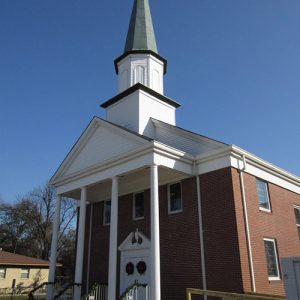 First United Methodist Church
First United Methodist Church 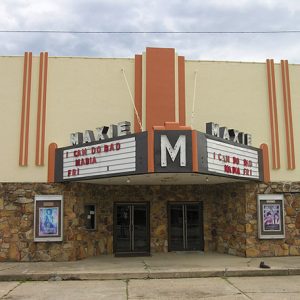 Maxie Theatre
Maxie Theatre 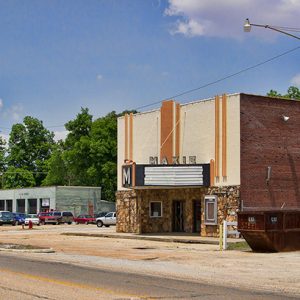 Maxie Theatre
Maxie Theatre 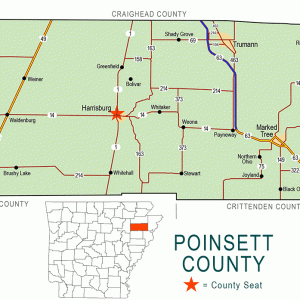 Poinsett County Map
Poinsett County Map 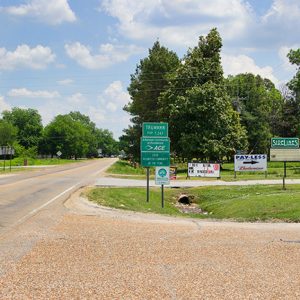 Trumann Street Scene
Trumann Street Scene 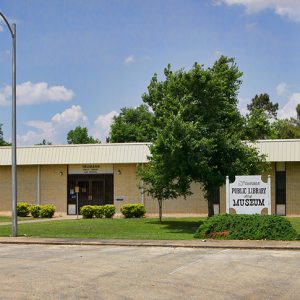 Trumann Library and Museum
Trumann Library and Museum 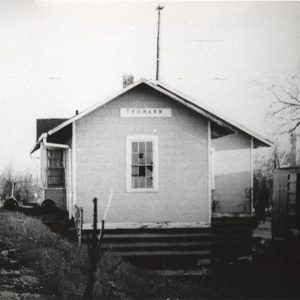 Trumann Depot
Trumann Depot 



Comments
No comments on this entry yet.